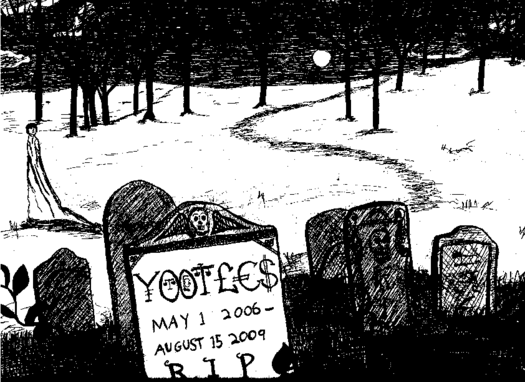Yootles Postmortem

I introduced the social currency (or scrip) Yootles in 2006 with the (needless to say, quixotic) goal of changing the social norms about money. We had two specific reasons for an alternative currency:
- We wanted to run prediction markets and needed a way around anti-gambling laws in the US
- Many people find the idea of using money to solve group decision problems simply repugnant
Aside from those considerations, money is superior in almost every way to more restricted, localized currency or any formal favor-exchange system. The more liquidity the better. There’s just one way the disadvantage of illiquidity can be construed as an advantage: a complementary currency in a particular community can strengthen community ties by making it more costly to transact outside the community. [1] But that wasn’t one of my goals.
Yootles, then, were trying to be money without technically being money.
Market Norms vs Social Norms
People treat each other differently when money is involved. The supposed conflict between market norms and social norms is illustrated in the now classic example of the Israeli daycare center that instituted a nominal fee for late pickups. The fee not only backfired and yielded much greater parental tardiness — that alone is not surprising since the fee was just too low — but it couldn’t be undone by reverting to no fee. This led to the claim, popularized by Dan Ariely, that market norms crowd out social norms.
I disagree with that characterization. Here’s a better one, first proposed, as far as I know, by Aleks Jakulin. When there’s no price there’s complicated barter going on where we try to feel each other out and factor in everything we can think of to make sure the optimal (socially efficient) thing happens. When there is a price we assume that the price captures all those desiderata. That’s the whole beauty of prices. So in the Israeli daycare example it’s not that you couldn’t switch back to social norms, it’s that temporarily putting a low price on being late was tantamount to declaring that being late was not much skin off the daycare provider’s nose. It was that revelation that was not undoable (except by raising the price, of course).
The Yootles Agenda
I’m actually baffled by the claimed conflict between market norms and social norms. Doesn’t the ability to make utility transfers just increase the opportunities to help one another and cooperate, and to do so fairly? To an economist these things are obvious. The one thing you lose is indebtedness, which can help to strengthen weak ties. Like if I help you, we then have to wait for or seek a “next time” for you to reciprocate. This is related to the disadvantage qua advantage of lower liquidity with community currencies. But as with illiquidity, I view indebtedness as mostly negative, especially if the social ties in question are either already strong — the extreme being a married couple — or nonexistent, as with strangers.
“I naively thought that with the right interfaces and infrastructure, normal people could be coaxed into thinking like economists.”
So not only don’t I think that social norms and market norms conflict, I wanted to combine the best of both. I naively thought that with the right interfaces and infrastructure, normal people could be coaxed into thinking like economists. Social currency, technology-intermediated decision mechanisms and accounting, even Hansonian decision markets in social settings.
Yootles Are Dead, Long Live Yootles
Much of what I was trying to do with Yootles — not least the creation of a new currency — now seems hopelessly naive. Perhaps I’m just too weird for my own intuitions about potential alternative social institutions to be realistic. But Yootles, minus the currency itself, lives on in the Soule-Reeves microeconomy. Bethany Soule and I literally pay each other (in dollars) for all manner of parenting activities and to resolve conflicting preferences in household decisions both big and small. We’ve got what I think is a pretty clever infrastructure — i.e., verbal and computational protocols — for making actual accounting almost painless. If you want to learn what Yootles turned into, I’ll let Bethany tell you all about it.
Footnotes
[1] That’s an explicit goal of Ithaca Hours, for example. Proponents of such local currencies cite many other benefits, such as valuing people’s time equally, but I think they’re confused about the the underlying economics.
Illustration by Kelly Savage
